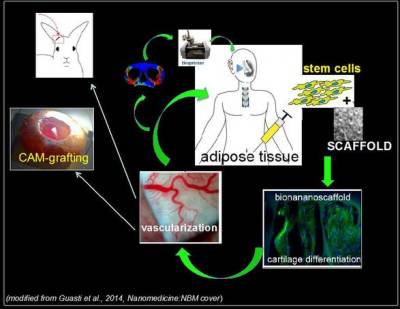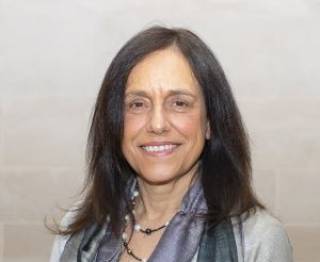Biography
Patrizia Ferretti’s initial background was in biology (University of Pisa, Italy) and neuropharmacology (Mario Negri Institute for Pharmacological Research)/ neurobiology (post-doctoral Fellow Max Planck Institute, Goettingen, Germany). She then gained experience in molecular biology and organ regeneration in Prof. J.P. Brockes’ laboratory in London before setting up her own laboratory at the Eastman Dental Institute.
Her lab has identified a number of cellular and molecular mechanisms which play a role in response to injury and repair, or disease, in animal models, and more recently established valuable models for the study of human diseases using stem/progenitor cells.
Work includes demonstrating that:
- Dystrophin-deficient astrocytes derived from reprogrammed cells of patients with Duchenne muscular dystrophy display cell autonomous defects that could contribute to brain comorbidities in these patients.
- Paediatric ADSCs are highly plastic and can be valuable for autologous cell therapy in children in combination with novel nanomaterials offer much promise for the repair of craniofacial deficits in these patients.
- Changes in neural progenitors and in the extent of haemorrhage and apoptotic response following spinal cord injury are associated with impaired regenerative ability. Secondary response to injury can be reduced by targeting some of the pathways involved in these responses recently identified in her laboratory.
- PAD enzymes are important regulators of neural injury response in animal models and in human neural cells in vitro, where they are effectors of calcium-dependent apoptosis, and new putative PAD inhibitors, developed through a close collaboration with medicinal chemists, are potential neuroprotective agents.

Research
Patrizia Ferretti has a long-standing interest in the basic mechanisms governing regeneration of a variety of complex body structures in vertebrates, and on the relationship between regeneration and the normal and abnormal development of such structures. Within this context her current work is mainly focused on issues of stem cell plasticity and differentiation potential and their underlying molecular basis, on how this could be used to develop models of human diseases, particularly childhood diseases, and on developing strategies for restoring functionality in damaged or diseased human tissues with a particular focus on the nervous system and craniofacial abnormalities. This work is underpinned by valuable collaborations with clinicians, bioengineers, and material scientists.
Teaching Interests
Patrizia Ferretti’s academic posts have all been in postgraduate Institutions, hence her formal teaching has been mainly directed to postgraduate students. She has set up a new lecture course when she was a Lecturer at the Eastman Dental Institute and has contributed lectures to postgraduate and undergraduate courses at UCL Great Ormond Street Institute of Child Health (UCL GOS-ICH), UCL and abroad (France and Italy) and to various short courses.
She is co-Director of the MSc on ” Cell and Gene Therapy” at UCL Great Ormond Street Institute of Child Health and directors of two modules that are part of this course: she has designed, runs and is the tutor of the Stem Cells and Tissue Repair Module, and organizes and oversees the Laboratory Projects Module. She also continues to contribute to postgraduate teaching at UCL GOS-ICH and UCL.
She supervises several undergraduate and Master projects, in addition to PhD and MD students. She is also a member of the Research Degree Committee and of the Education Committee at UCL GOS-ICH.
Ongoing work
- Bioengineering cartilage with a focus on autologous mesenchymal stem cells for external ear and facial reconstruction.
- Investigating the role of dystrophin in IPSC-derived human neural cells in healthy and DMD 2D and 3D in vitro models, and during human brain development.
- Using human models of acrodysostosis type I and II, caused by mutations in PRKR1A and PDE4D, respectively, for studying disease mechanisms and potential therapies.
UCL Appointments
- Professor of Regenerative Biology
University College London, Developmental Biology & Cancer Dept
Degrees
Doctor of Philosophy
Mario Negri Institute for Pharmacological Research, Milan, Italy, 1981Doctor of Philosophy
Universita degli Studi di Pisa, 1978
Fields of Research
- Human disease modelling
- Induced Pluripotent Stem cells (IPSCs)
- Neural Stem Cells
- Mesenchymal Stem Cell
- Tissue Repair
- Cartilage engineering
- Brain
- Choroid Plexus
- Craniofacial
- Development.
Diseases
- Acrodysostosis
- Down’s Syndrome
- Duchenne Muscular Dystrophy
- Traumatic Injury
Methods
- Cell and organotypic cultures
- Cell tracking
- Cell transplantation
- Gene and protein expression profiling
- Immunohistochemistry
- Fluorescence microscopy techniques
- Confocal microscopy
- Image analysis
- In vivo electroporation
- Ionophoresis and microinjection
- Induced Pluripotent Stem Cells (iPS)
- Light microscopic techniques
- Microarrays
- Proteomics
- Pharmacological and genetic manipulations
- Group Members
Miss Reem Alkharji
PhD Student
reem.alkharji.19@ucl.ac.uk
UCL Profiles page: Reem AlkharjiDr Oliver Gardner
Research Fellow
o.gardner@ucl.ac.uk
UCL Profiles page: Oliver GardnerMr Mohammed Hamdi Ibrahim Ali
PhD student
sejjm52@ucl.ac.uk
 Close
Close


